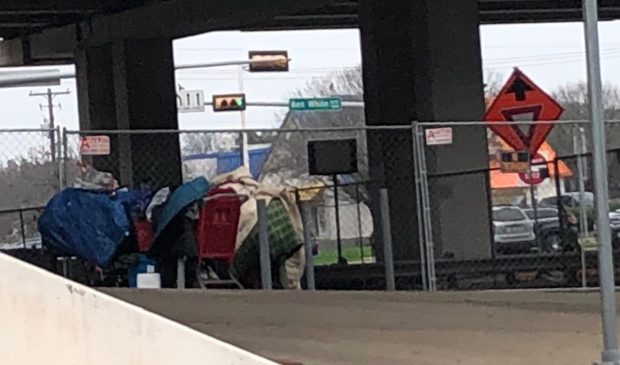Council wants more cooperation, action at watershed homeless sites
Wednesday, February 20, 2019 by
Chad Swiatecki City Council members sitting on the Health and Human Services Committee told city staff last week they want more urgency and cross-department team work in the execution of a new pilot program to clean up homeless encampments located in the city’s watershed.
Recently the Watershed Protection Department launched the program at nine sites. The program combines cleanups of the camps – with varying degrees of advance notice based on site severity – with outreach from social services providers to help those living in the camps receive assistance and find housing. That pilot program is in addition to a four-year, $1 million contract with Work Quest to perform repeated cleanups of camps in watershed areas throughout the city.
The intent of the nine-site pilot program is to gather data on how much the services-first approach would cost to expand to all watershed homeless sites, with the goal of placing those people into stable housing.
At last Wednesday’s committee meeting Council Member Ann Kitchen spent several minutes digging into the methodology and reasoning behind how the nine sites were selected, and the efficacy of routinely cleaning up other sites that will become quickly repopulated if housing and other assistance aren’t widely offered.
Kitchen also pressed the two presenters on hand – watershed department assistant director Jose Guerrero and engineer Ramesh Swaminathan – to conduct analysis of assorted culverts and other watershed locations around the city that could be redesigned to prevent them from being utilized as makeshift shelters.
“The problem with the cleanups is that people don’t have a place to go, so the cleanups are episodic and not an ultimate solution for folks,” she said. “This program cannot solve all those problems, and I’m not suggesting that. I’m just thinking that I’m concerned this program is not going far enough, particularly with regard to the places that are the most dangerous for people, and that simply cleaning up a culvert and not taking the action that’s necessary so that people are gotten out of harm’s way is not going to work.”
Swaminathan said analysis of culvert reconstruction at a pilot site on East Riverside Drive is already underway, with more analysis possible soon. He told the committee members that the hope is to make the service-oriented cleanups widespread after it is determined how much City Council will have to allocate to such an effort in upcoming budgets.
“Part of the issue is watershed cleanups are much more expensive and much more involved than cleanup at an underpass … there are access issues, and creek-type environments are hard to get to,” he said. “Hopefully within the next six months we can increase the capacity of this pilot contract … and at the end of it we’ll have less sites to clean up.”
Mayor Pro Tem Delia Garza also said she is concerned about the department’s decision to test “leave no trace” camping education with certain homeless individuals. That practice would call for showing those living in low-concern homeless sites how to safely build a fire for heat and cooking and how to relieve themselves with low sanitary impact.
“This is a really different scenario. It’s not just people camping for the weekend … these are their homes,” she said. “I wonder if there’s a different way we can talk about those principles while we’re helping them.”
In a separate presentation about progress of reorganizing the operations at the Austin Resource Center for the Homeless, committee members learned the new contract with operator Front Steps is set to go into effect on April 1, with a national consultant hired for training and hiring so that changes in service delivery can begin in September.
Council Member Kathie Tovo asked Adrienne Sturrup, assistant director for health equity and community engagement for Austin Public Health, to look into using at least some of the covered parking area at ARCH for new lockers for the local homeless population to safely store their belongings, and as a cooling area to provide water on hot summer days.
Photo by Jo Clifton.
The Austin Monitor’s work is made possible by donations from the community. Though our reporting covers donors from time to time, we are careful to keep business and editorial efforts separate while maintaining transparency. A complete list of donors is available here, and our code of ethics is explained here.
You're a community leader
And we’re honored you look to us for serious, in-depth news. You know a strong community needs local and dedicated watchdog reporting. We’re here for you and that won’t change. Now will you take the powerful next step and support our nonprofit news organization?










